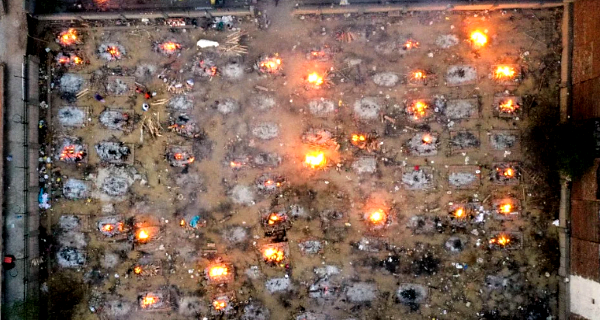Sin Chew Daily
Is the virus just about to start ravaging humanity? No epidemiologists in this world can say for sure.
Many are becoming increasingly pessimistic after the "feel good" mood at the start of the vaccine's global rolllout.
According to the Johns Hopkins coronavirus-tracking map, the global pandemic has been hovering at the peak for some time now, with daily new increases fluctuating at different phases in different countries, including here in Malaysia.
Going back to December 8 last year when the world's first dose of COVID-19 vaccine was administered in the UK, the cumulative global total of confirmed cases stood at 68.69 million. For the 331 days since the first positive case was reported, the virus had spread at an average daily rate of 208,000 cases. And for the following 132 days up till April 25, the total leapt by 78.94 million or 598,000 new cases per day. The 2.88 times difference between the two periods before and after the vaccine rollout says everything!
Take India for instance, daily new increases showed a downward trend since mid-September last year, reaching a low of slightly above 10k in a day. However, the curve began to deflect upward from mid-March, and until April 25, we have seen more than 310k new cases reported daily for several days in a row, hitting a global record of 349k on Sunday. It is projected that the pandemic will peak in India around mid-May with daily new infections in excess of half a million!
If we were to take the US infection rate of 10% as a reference, India's total cases could eventually reach 137 million (10% of the country's population), or almost eight times the current total of 17.3 million. The actual situation could be worse, given the higher population density and far inferior public health safety and medical care standards compared to the US.

India's healthcare system is completely overwhelmed in the new wave of infections. Respirators and oxygen supply are in severe dearth, and bodies are waiting to get burned in the country's numerous crematoriums. Many people simply lack the fundamental knowledge to fight the virus while the super-rich are fleeing to the UK in their private jets. Many countries have since banned travels to and from India.
Heath DG Noor Hisham Abdullah says Malaysia will do its best to implement public health safety and immunization program lest we fall into the trap of India's tsunami-like explosive virus infections.
What caused the "pandemic tsunami" in India? A BBC documentary shows that the Indian government began to relax the anti-virus rules following a marked slowdown in new COVID-19 cases in February. Entertainment outlets, malls and recreational spots were allowed to resume operation with lax crowd control during the recent festivities, giving the virus an excellent opportunity to spread wildly.
Sounding familiar? Perhaps some might not like it, but it is true that such massive crowds are common at the many Ramadan bazaars all across Malaysia, except some of the states where the bazaars have been banned for two weeks due to SOP violation. The government's decision to extend the operating hours of Ramadan bazaars to 2am beginning last Saturday is contravening the principle of fighting the coronavirus.
Defense minister Ismail Sabri Yaakob explains that the operating hours of Ramadan bazaars are extended to 2am because people normally go out shopping only after isyak and tarawih prayers.
Just as nations are doing their utmost to defeat the virus, we have reported over 2,000 new cases each day for the past two weeks. A slight negligence on our part will open up a crack for the explosive spread of the virus.
Health minister Adham Baba has said that if Malaysians do not adhere to the SOPs, we will very likely see more than 5,000 new cases each day in late May. Therefore, the government must step up effort to contain the spread of the virus and not to extend the business hours of Ramadan bazaars during such a crucial moment.
The rapid spread of the pandemic in India has nullified all previous efforts put in. Prime minister Tan Sri Muhyiddin Yassin has said the pandemic has cost the country more than RM300 billion in economic losses on top of a 5% shrinkage in our GDP. He also says the country has not much money left. Indeed, the government has run out of money and cannot afford to take the impact from a fresh wave of infections. As such, the government must step up control to keep the virus at bay.
The fight against the virus will still be on for a long time to come, as we won't stop the virus completely. All we can do is to put the virus gradually under control. This war is going to be a protracted one, and given the trend of the pandemic around the world at this juncture, we have to accept the fact that the situation is indeed out of hand now.
If we don't wish to step into the shoes of India, then we must do our utmost not to allow the smallest opening in our defense line. Even though the government declared a state of emergency earlier this year, its effects on the virus have been minimal. We mustn't think a pandemic tsunami will not hit us anytime soon. It could be a lot nearer than we thought.
ADVERTISEMENT
ADVERTISEMENT


































